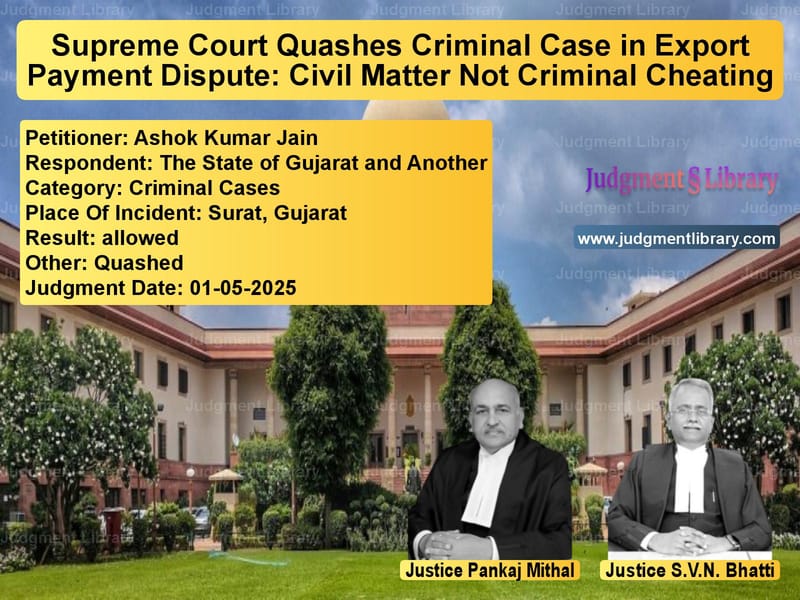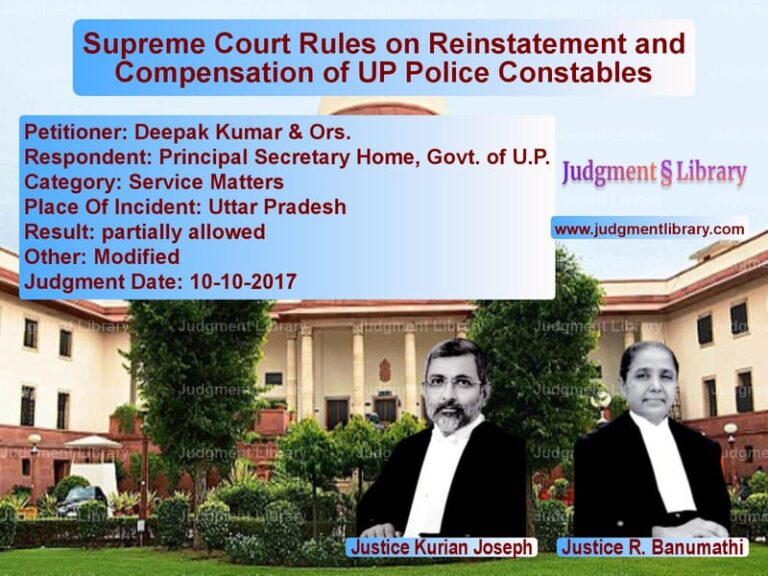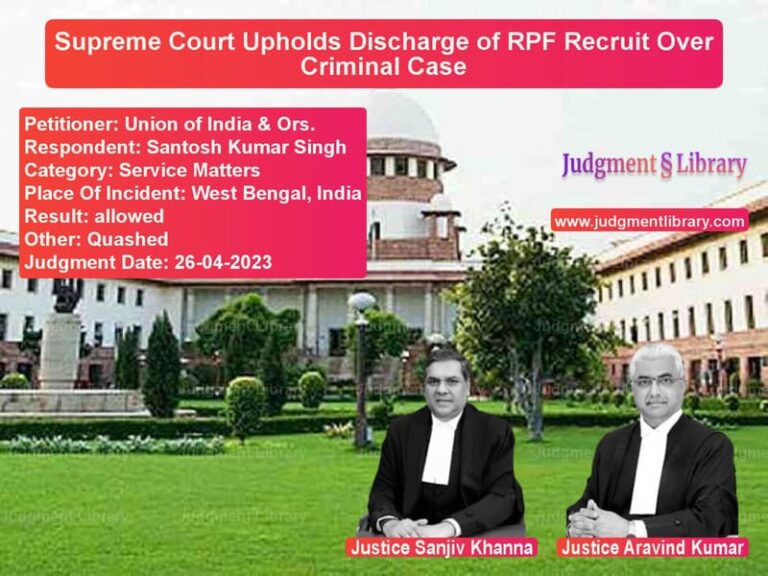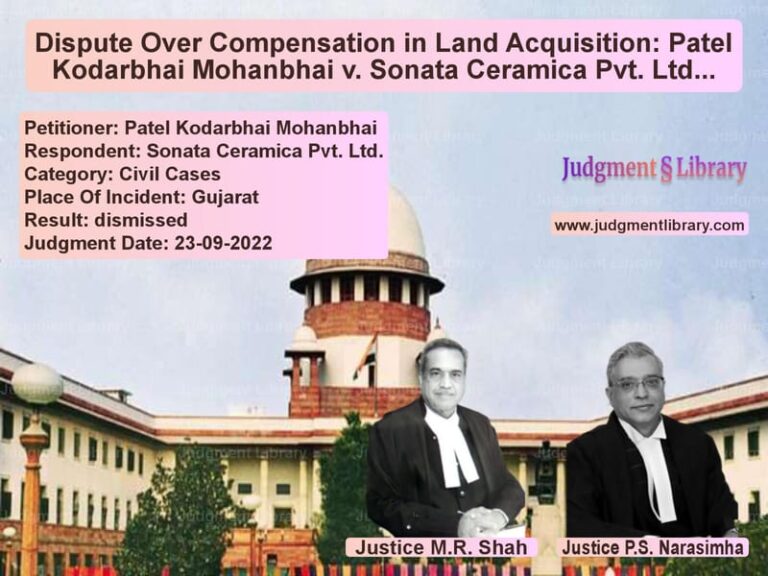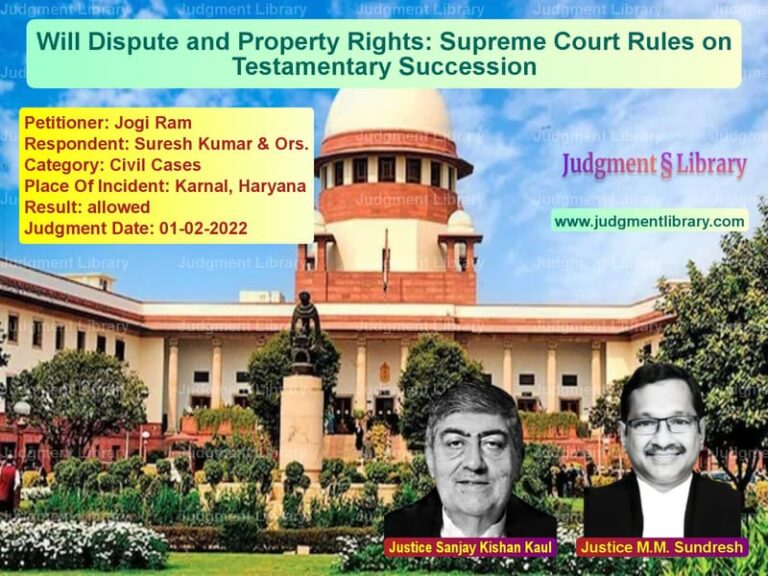Supreme Court Quashes Criminal Case in Export Payment Dispute: Civil Matter Not Criminal Cheating
In a significant ruling that clarifies the distinction between civil disputes and criminal offenses, the Supreme Court of India recently quashed an FIR alleging cheating and criminal breach of trust in an international export transaction. The case involved Ashok Kumar Jain, a Sri Lankan businessman, and an Indian textile exporter from Surat, highlighting how business disputes over unpaid invoices can sometimes be wrongly framed as criminal cases.
The dispute began in March 2012 when Jain approached a Surat-based business called Ansh Prints, operated by the second respondent. Jain expressed interest in purchasing sarees for export to Sri Lanka. Since Ansh Prints didn’t have an import-export license, the parties agreed that the goods would be shipped through M/s Oswal Overseas, a licensed exporter. Between October 2013 and March 2014, goods worth approximately Rs. 34.71 lakh were exported to Sri Lanka through this arrangement.
The core of the dispute emerged when payments for these exports remained outstanding. Despite demands and even a personal visit by the Indian businessman to Sri Lanka, the payments weren’t made, leading to the filing of an FIR in January 2017 alleging offenses under Sections 406 (criminal breach of trust) and 420 (cheating) of the Indian Penal Code.
Read also: https://judgmentlibrary.com/supreme-court-upholds-gang-rape-conviction-but-acquits-under-sc-st-act/
The Legal Battle Begins
Ashok Kumar Jain approached the Gujarat High Court seeking quashing of the FIR, arguing that the accusations didn’t constitute criminal offenses but represented a civil dispute over unpaid trade dues. The High Court, however, dismissed his petition, observing that the appellant had misrepresented and induced the second respondent to deliver goods. The High Court found that the offenses mentioned in the FIR were substantiated and refused to exercise its powers to quash the proceedings.
This led to the appeal before the Supreme Court, where Senior Counsel Mr. P.S. Patwalia argued for the appellant that the accusations in the FIR didn’t make out offenses of criminal breach of trust or cheating. He contended that either for unexported or exported goods, the liability towards unpaid sale price was with M/s Oswal Overseas, and treating a pure dispute over unpaid sale price as criminal prosecution was improper.
The appellant’s legal team presented a crucial argument: “The FIR refers to the total outstanding from the export made through M/s. Oswal Overseas as Rs. 39,18,108/- and the consignment worth Rs. 4,46,764/- could not be exported to the appellant. M/s. Oswal Overseas, through one Vikrambhai, paid the said amount to the second respondent, thus reducing the unpaid sale consideration of exports made to the appellant to Rs. 34,71,344/-. Either for un-exported or exported goods, the liability towards the unpaid sale price is with M/s. Oswal Overseas.”
The Respondent’s Position
Opposing the appeal, Mr. Mohit D. Ram, representing the second respondent, argued that business transactions had indeed occurred, and sarees had been exported through M/s Oswal Overseas based on negotiations between the appellant and the second respondent. He described M/s Oswal Overseas as a mere facilitator and emphasized that the goods sold had ultimately benefited the appellant. The non-payment of the full sale price, according to the respondent, amounted to criminal breach of trust and cheating.
The respondent’s counsel urged the Court to allow the investigation to proceed, arguing: “The investigation into the allegations of the FIR would disclose whether the case warrants filing a chargesheet or closure report. At this stage, invoking the power of section 482 of the Code by the appellant is illegal.” He also referred to a status report filed by the state, suggesting that evidence gathered so far indicated the appellant’s complicity in convincing the second respondent to do business through M/s Oswal Overseas.
The Supreme Court’s Analysis
The Supreme Court bench comprising Justice Pankaj Mithal and Justice S.V.N. Bhatti began by examining the legal principles governing the quashing of FIRs under Section 482 of the Criminal Procedure Code. The Court referenced several precedents, including State of Odisha v. Pratima Mohanty, which established that quashing a complaint should be an exception rather than a rule, and courts shouldn’t embark on inquiries about the reliability of allegations at this stage.
The Court then delved into the essential ingredients of the offenses alleged. Quoting from Radheyshyam v. State of Rajasthan, the Court outlined the requirements for criminal breach of trust: “For an offence punishable under Section 406, IPC, the following ingredients must exist: i. The accused was entrusted with property, or entrusted with dominion over property; ii. The accused had dishonestly misappropriated or converted to their own use that property, or dishonestly used or disposed of that property or wilfully suffer any other person to do so; and iii. Such misappropriation, conversion, use or disposal should be in violation of any direction of law prescribing the mode in which such trust is to be discharged, or of any legal contract.”
Regarding cheating, the Court referred to Hridaya Ranjan Prasad Verma v. State of Bihar, emphasizing: “In determining the question it has to be kept in mind that the distinction between mere breach of contract and the offence of cheating is a fine one. It depends upon the intention of the accused at the time of inducement which may be judged by his subsequent conduct but for this subsequent conduct is not the sole test. Mere breach of contract cannot give rise to criminal prosecution for cheating unless fraudulent or dishonest intention is shown right at the beginning of the transaction, that is the time when the offence is said to have been committed. Therefore it is the intention which is the gist of the offence.”
Key Findings and Rationale
The Supreme Court made several crucial observations after examining the facts and documents. First, the Court noted that the respondent had not availed the services of M/s Oswal Overseas as a mere transport carrier but as the official exporter. The documents showed that the appellant was the consignee and M/s Oswal Overseas was the exporter, with the beneficiary customer clearly identified as M/s Oswal Overseas in the banking documents.
The Court observed: “Therefore, the entrustment was made to M/s. Oswal Overseas by respondent no. 2 and not to the appellant.” This finding was crucial because for criminal breach of trust to be established, the property must be entrusted to the accused person. In this case, the goods were entrusted to M/s Oswal Overseas for export, not directly to the appellant.
The Court also examined whether the necessary dishonest intention existed at the inception of the transaction, which is essential for proving cheating. The Court found that the transactions had been conducted through proper commercial channels over an extended period, and the mere non-payment later didn’t establish that the appellant had fraudulent intention from the beginning.
In a significant observation, the Court stated: “Looking at the controversy from any perspective, a mere civil dispute has been given the colour of an offence of cheating and criminal breach of trust. We have perused the FIR and are convinced that the inducement is an explanation to contradict the documents through which exports have been completed. In the circumstances of this case, by referring to inducement, the continuation of investigation/prosecution into the offence of cheating and breach of trust would amount to an abuse of the process of law.”
The Final Ruling
The Supreme Court allowed the appeal, setting aside the High Court’s order and quashing the FIR. The Court concluded that the continuation of criminal proceedings amounted to an abuse of the legal process, and the dispute was essentially civil in nature between the appellant and M/s Oswal Overseas.
The Court firmly stated: “For the above reasons, and particularly appreciating Annexures-P1 to P3, we are of the view that the continuation of the FIR against the appellant is an abuse of the process of law, and at best, the non-payment of the sale price could be a civil dispute between the appellant and M/s. Oswal Overseas.”
This judgment reinforces the important legal principle that mere breach of contract or non-payment of dues, without evidence of fraudulent intention at the inception of the transaction, doesn’t constitute criminal offenses of cheating or criminal breach of trust. The ruling serves as a reminder that criminal law shouldn’t be used as a tool for recovery of civil debts, and helps maintain the distinction between civil wrongs and criminal offenses in commercial transactions.
The decision is particularly significant for international trade, where payment disputes often arise due to various commercial reasons, and provides clarity that such disputes should typically be resolved through civil remedies rather than criminal prosecution, unless clear evidence of criminal intent exists from the beginning of the transaction.
Petitioner Name: Ashok Kumar Jain.Respondent Name: The State of Gujarat and Another.Judgment By: Justice Pankaj Mithal, Justice S.V.N. Bhatti.Place Of Incident: Surat, Gujarat.Judgment Date: 01-05-2025.Result: allowed.
Don’t miss out on the full details! Download the complete judgment in PDF format below and gain valuable insights instantly!
Download Judgment: ashok-kumar-jain-vs-the-state-of-gujarat-supreme-court-of-india-judgment-dated-01-05-2025.pdf
Directly Download Judgment: Directly download this Judgment
See all petitions in Fraud and Forgery
See all petitions in Contract Disputes
See all petitions in Commercial Arbitration
See all petitions in Debt Recovery
See all petitions in Criminal Defamation
See all petitions in Judgment by Pankaj Mithal
See all petitions in Judgment by S.V.N. Bhatti
See all petitions in allowed
See all petitions in Quashed
See all petitions in supreme court of India judgments May 2025
See all petitions in 2025 judgments
See all posts in Criminal Cases Category
See all allowed petitions in Criminal Cases Category
See all Dismissed petitions in Criminal Cases Category
See all partially allowed petitions in Criminal Cases Category

